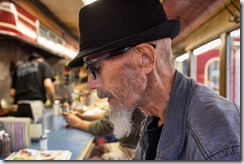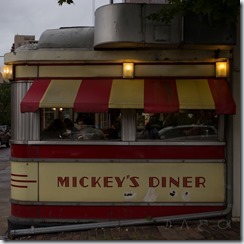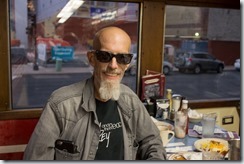Monty suggested that we go to Mickey’s Dining Car in St. Paul. It would be cool, because Monty has a special kind of discriminating taste. He’s been unapologetically direct with his judgment for as long as I’ve known him. Others had told me that Mickey’s has the best burgers in the twin cities. The story that Monty told me was that Traveler’s wanted the property in order to knock the diner down and expand their building, which takes up the rest of the entire block. Mickey’s refused to sell out and stands there as this quirky little art deco diner sitting right next to this massive typical corporate building. We were going because it was a cool place run by righteous folk.
Monty Lee Wilkes is one of my favorite sound engineers. Major concert tours take a small army of people to handle production. Most of the crew are local, brought on for just the event. They work under the direction of the tour’s light and sound engineers. The front of house engineer is responsible for what the audience actually hears, directing the assembly of the sound system, and then mixing the live show itself.
The job lives in the intersection between technical capabilities and creative sensibilities. Sound engineers have limited truck space, electrical power, and time. Each location is a unique environment with its own limits. Dealing with those problems is table stakes for delivering what is a subjective and emotional experience between an artist and their audience.
Many of the greatest musical artists of the last couple of decades have turned to Monty to make that connection. When we first started hanging out back in the 90s, he’d already established his reputation having worked with Nirvana, The Replacements, and many others. We hung out at some iconic places like the Roosevelt Hotel in LA, and also quite a few non-descript places where an awful lot of the music gets made. I’m thinking of the arena loading docks, hotel rooms, and backstage areas that all blur into one.
Throughout it all, Monty has always been faithful to his own sense of musical truth. He listens with his own ears and makes up his own mind. While that might seem like an obvious requirement for a sound man, in practice it isn’t as common as you might think. In addition to the paying audience, there are record company people, radio and other media critics and lots of people with their own opinions about what the music should sound like. The artist can’t actually hear the sound that the audience hears. They rely on the feedback that they get from the audience and media, who may not be very articulate about their opinion. Which is in sharp contrast to Monty, who is extremely articulate about his opinion.
Monty is an atheist and a scientist. He lives in a world of meters and controls. Power and sound pressure levels are measured and monitored. Time delays are calculated within milliseconds. All of this to create an illusion that you are listening to the artist, not the sound system. At its best, music is a transcendent emotional experience. Monty sees his job as creating the environment in which the artist can deliver that immeasurable moment at the center of it all.
Monty and I would reconnect every couple of years and catch up on music, life, and which artists he’d parted ways with. There were lots of them. Part of this is the nature of the business, part of it was him sticking to his own beliefs. Prince decided his girlfriend needed to be advising at the mixing console because she really understood him. Monty walked out. In another example, a lead singer believed that it was his job to bring Buddhist enlightenment to the rock and roll masses. Monty didn’t have that dial on his sound system. He also didn’t have a dial for curing cancer.
Suddenly there wasn’t all of the time in the world anymore. So I got on a plane and he picked me up and drove me to Mickey’s Dining Car. He’d had chemo that morning. Once we got to the parking lot, he asked if I minded if he smoked some weed in his car. I didn’t mind, but chose to wait outside.
 We ordered food and talked. Music is his center and he stays faithful to it. We talked about how powerful music can be in keeping someone just barely on this side of the sanity line. It can provide some profound moments of truth that cuts through everything and lets you know that you aren’t alone. “We were ‘weirdos’, you know?” Of course I knew. The creative world is much more accepting of who you are than the mainstream. “The whole scene really celebrated individuality, until the business took over and the bastards ruined that too.”
We ordered food and talked. Music is his center and he stays faithful to it. We talked about how powerful music can be in keeping someone just barely on this side of the sanity line. It can provide some profound moments of truth that cuts through everything and lets you know that you aren’t alone. “We were ‘weirdos’, you know?” Of course I knew. The creative world is much more accepting of who you are than the mainstream. “The whole scene really celebrated individuality, until the business took over and the bastards ruined that too.”
The food arrived. Monty was surprised that he’d ordered a milkshake, fries, and a full breakfast. “I don’t know why I ordered so much food.” Having seen the haze inside the car, I told him I had a suspicion. He laughed and explained that he was down to 120 pounds and was having a hard time eating, so this was literally just what the doctor ordered.
We talked about death. I asked Monty how he viewed the soul. “As a scientist, I’m compelled to believe that energy cannot be either created or destroyed. The soul or spirit is nothing other than pure energy, so it must be transformed somehow.” It seemed to me that he was fine accepting that, just like he recognizes the magic of the right musical moment.
On the ride home, we listened to music and talked about lots of it. I was surprised to find out his all time favorite band was The dBs. I had worked on a demo with them back in the offices of the New York Rocker long before Monty and I had ever met. Monty mentioned that Andy Schwartz, the publisher of the Rocker had reached out and sent him a note when he had heard about the cancer.
He dropped me off and we left each other feeling a little less weird and alone.



Discussion
Comments are disallowed for this post.